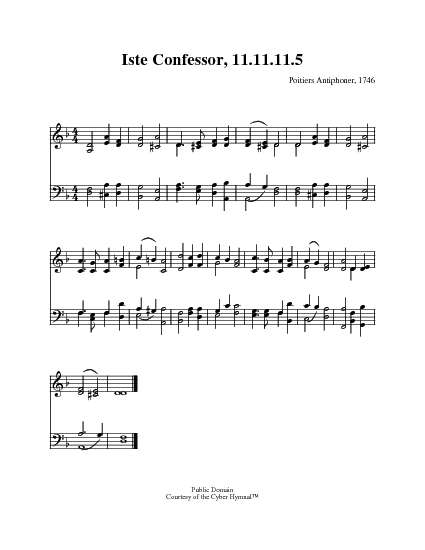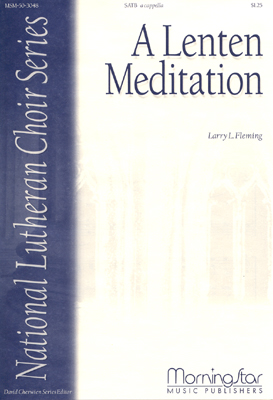- |
User Links
Lord of Our Life and God of Our Salvation

Lord of our life, and God of our salvation
Author: Matthäus Appeles von Löwenstern (1644); Paraphraser: Philip Pusey (1834)Tune: CLOISTERS (Barnby 33333)
Published in 220 hymnals
Printable scores: PDF, MusicXMLAudio files: MIDI, Recording
Representative Text
1 Lord of our life, and God of our salvation,
star of our night, and hope of every nation,
hear and receive thy church's supplication,
Lord God Almighty.
2 See round thine ark the hungry billows curling,
see how thy foes their banners are unfurling;
Lord, while their darts envenomed they are hurling,
thou canst preserve us.
3 Lord, thou canst help when earthly armour faileth,
Lord, thou canst save when deadly sin assaileth;
Lord, o'er thy church nor death nor hell prevaileth:
Grant us thy peace, Lord.
4 Grant us thy help till foes are backward driven,
grant them thy truth, that they may be forgiven,
grant peace on earth, and, after we have striven,
peace in thy heaven.
Source: CPWI Hymnal #326
Author: Matthäus Appeles von Löwenstern
Löwenstern, Matthäus Apelles von, was born April 20, 1594, at Neustadt, in the principality of Oppeln, Silesia, where his father was a saddler. He early distinguished himself by his musical abilities, was appointed in 1625, by Duke Heinrich Wenzel of Münsterberg, as his music director and treasurer at Bernstadt: in 1626, director of the princely school at Bernstadt; and in 1631 Rath and Secretary and also Director of finance. Thereafter he entered the service of the Emperors Ferdinand II. (d. 1637), and Ferdinand III. as Rath, and was ennobled by the latter. Fi¬nally he became Staatsrath at Oels to Duke Carl Friedrich of Münsterberg, and died at Breslau, April 11, 1648 (Koch, iii. 57-60 ; Allgemeine Deutsche Biog. xix. 318, &c). Lowen… Go to person page >Paraphraser: Philip Pusey
Pusey, Philip, eldest son of Mr. Philip Pusey, and brother of Dr. Pusey, was born June 25, 1799, and died July 9, 1855. His father, a son of the first Viscount Folkestone, had assumed the name of Pusey instead of that of Bouverie. [George Arthur Crawford, M.A.] --John Julian, Dictionary of Hymnology (1907) Go to person page >Text Information
Related Texts
| First Line: | Lord of our life, and God of our salvation |
| Title: | Lord of Our Life and God of Our Salvation |
| German Title: | Christe, du Beistand |
| Author: | Matthäus Appeles von Löwenstern (1644) |
| Paraphraser: | Philip Pusey (1834) |
| Meter: | 11.11.11.5 |
| Language: | English |
| Copyright: | Public Domain |
- Year A, Ordinary Time, Proper 9 (14)
This is recommended for Year A, Ordinary Time, Proper 9 (14) by 2 hymnal lectionary indexes. - Year B, Epiphany Season, Transfiguration Sunday
- Year C, Ordinary Time, Proper 10 (15)
This is recommended for Year C, Ordinary Time, Proper 10 (15) by 2 hymnal lectionary indexes.
Notes
Lord of our life, and God of our salvation, p. 699, i. In the Life of Edward Bouverie Pusey, by Canon Liddon, this is looked upon as an original English hymn.
"It was at this time that he [Philip Pusey] composed the well-known ‘Hymn of the Church Militant.' . . . ‘It refers,' he writes to his brother, 'to the state of the Church'—that is to say, of the Church of England in 1834—assailed from without, enfeebled and distracted within, but on the eve of a great awakening" (vol. i., 1893, pp. 298, 299).
At p. 699, i., this hymn is described as "rather founded on the German than a translation"; but it bears too much resemblance to the German to be regarded as entirely original. The English Hymnal, 1906, gives the text of 1840, except that in 1840 stanza ii., 1. 3 is "darts of venom" iii., 1. 2 is "when sin itself," and v., 1. 3 is “or, after." [Rev. James Mearns, M.A.]
--John Julian, Dictionary of Hymnology, New Supplement (1907)


 My Starred Hymns
My Starred Hymns





